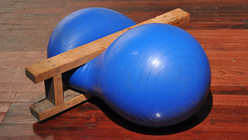Welcome to HELP DESK, step into my office! Each week I’ll be answering your queries about making, finding, marketing, buying, selling — or any other activity related to — contemporary art. Together, we’ll sort through some of art’s thornier issues. Email helpdesk@dailyserving.com with your questions, or use a free anonymizer like Anonymouse.org to send an email to the same address. Comments are enabled, but be good or be gone! All submissions will be treated as anonymous and become the property of Daily Serving.
Some galleries provide artists with information on who is purchasing their artwork… others do not. What’s up with that? I feel like smaller galleries are super paranoid of artists selling out from under them while bigger more stable galleries offer full contact information to artists.
I’m not a gallerist, so I asked around to see if anyone could help me shed a little light on this subject. Catharine Clark, of Catharine Clark Gallery in San Francisco, generously provided this information for me to share:
“We disclose the name of a collector to an artist when a sale is made. Often collectors and artists enjoy meeting one another, and we help to facilitate that when it’s possible. We disclose additional contact information when artists are in the process of determining what work can be available for a museum exhibit, for example, or if they ask for it because they want to write a thank you note or correspond in some way with the collector. Some collectors are very private, and the information about them is proprietary, so we evaluate each request as it is made and determine whether the use of the information will be respectful. We have had the unfortunate experience of the information being inappropriately shared and the collectors have then felt betrayed. Since we work on loan agreements with the museum registrars, collectors, and artists, usually it is at that point that all contact information becomes most transparent. We also maintain relationships with the collectors so that we are able to follow the whereabouts of work as people move or re-sell their collections.”
Of course, Catharine Clark is an established and highly professional operation. You might find a different set of standards at work with another, smaller or newer gallery. While I can’t speak to the “paranoia” of a gallery, I can offer some advice to artists just starting out: ask for a contract that specifically states that you need to be given collector information when a sale is made. I do believe that you have a right to know where your work is going.





